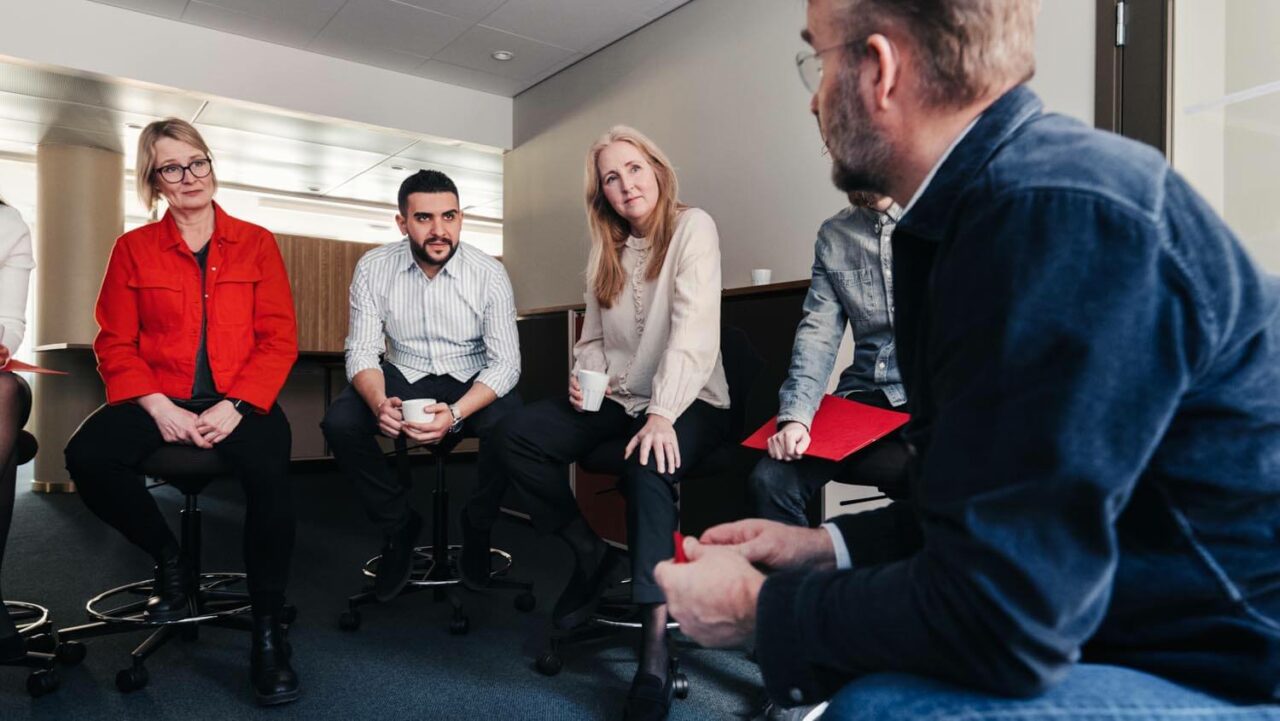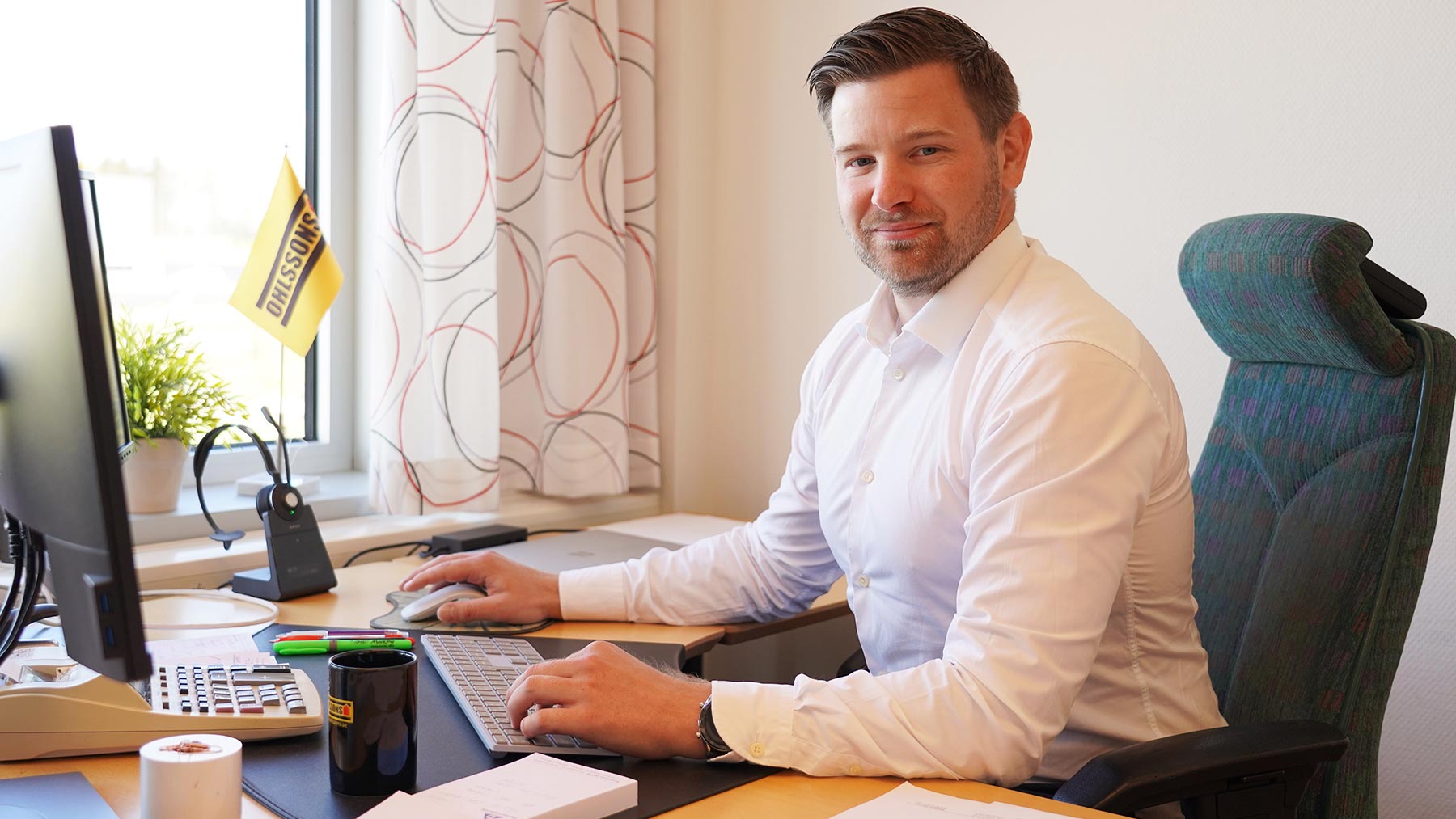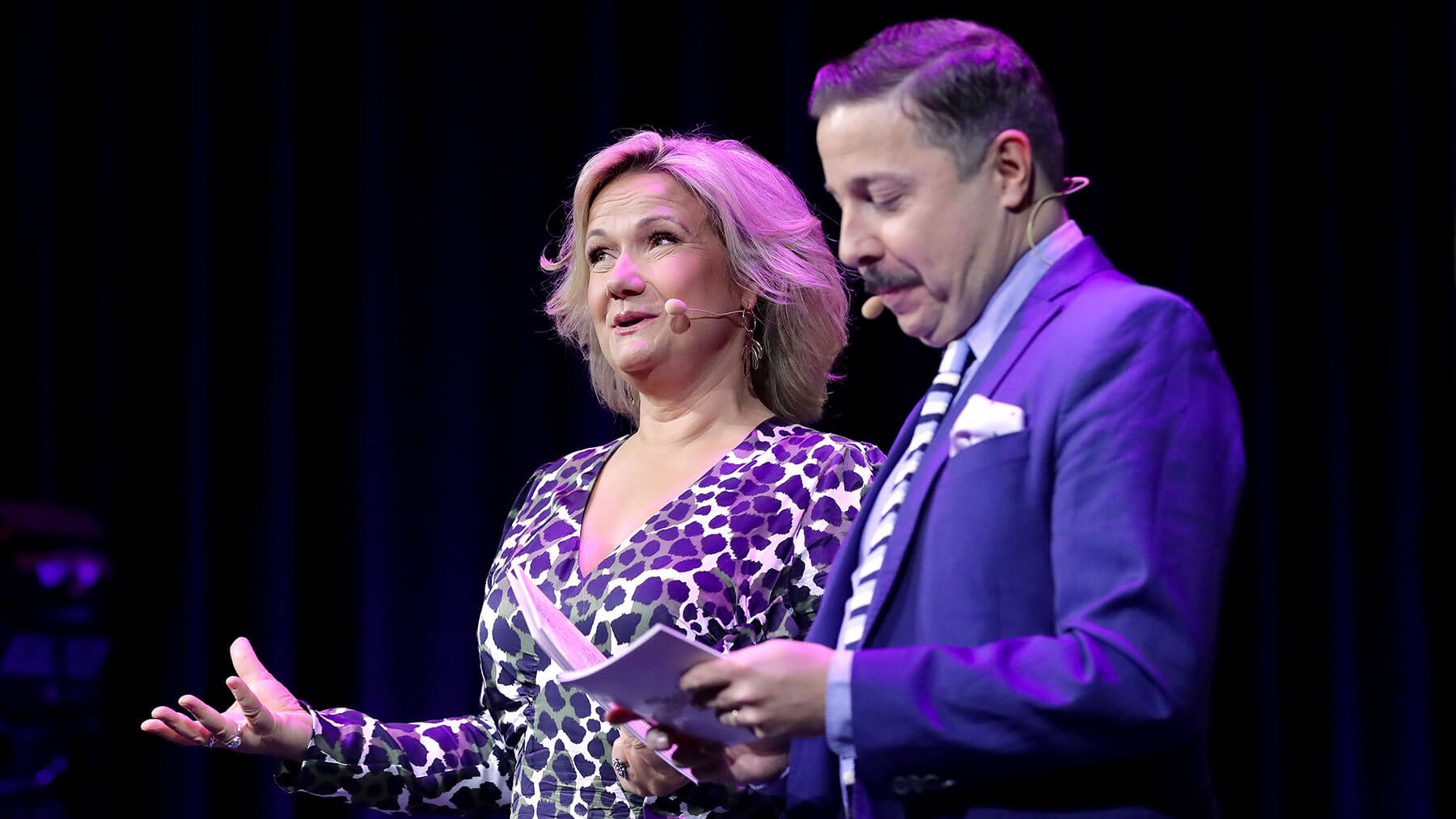Swedish Supreme Commander of the Armed forces speaks out about his job burnout

There was just too little Sverker – this is his simplest explanation.
Over all the years Sverker Göranson has managed to hold on to the essence of his own person, during a military career he describes as a natural and not at all forced ambition. His professional success came at a quick marching pace – up until the fall of 2012. Gradually, without even noticing the danger himself, there was too much Supreme Commander and too little Sverker. Finally his body said stop.
There are some meetings that don’t go at all the way I plan. I arrive at the Defense Headquarters in Stockholm with four pages of questions written down.
I walk nervously through the entrance as if I were about to take an exam on Sverker Göranson, head of this gigantic organization with at least 20,000 employees.
It’s an organization in the middle of a change process. Above him he has what his calls his own bosses – the Swedish Parliament, the Government and the Swedish people.
Being in this vice-like position is unavoidable, even just this past winter and spring the pressure has intensified after Russia’s military escalation. But we’re not here to discuss Swedish defense policy, but rather what happens when a manager reaches his limits and doesn’t have the energy to manage anymore. This is what Sverker Göranson experienced.
He comes directly from an exercise with a camouflage field uniform and a warm, solid handshake. He asks me if I want coffee. He laughs when I admit that the closest I have thus far come to Swedish defense is through my first husband, who was a military employee.
According to the SC, who interjects almost immediately, there are other ways to get close to the organization. But once at the visitors couch on the seventh floor I’m at least certain that he has humor. And a big heart. But also integrity – in addition to the ability to slam his fist on the table. What his colleagues have said about him seems honest, aside from some tiresome flattery.
But I have done my homework, and know that Sverker Göranson is the man from southern Sweden who had planned on applying to Chalmers University of Technology after studying at a technical high school. But first he filled in as an armored soldier at P6 in Kristianstad, where the motto was: “Honor. Obligation. Will.”
Those words train you to keep going – until you simply stop.
Along the way a lot happened after a friend convinced him to apply to the military academy, kick starting a career that quickly skyrocketed. At least until the brakes slammed down on everything in January last year when Göranson was forced to leave the Society and Defense National Convention in Sälen. He had to go home before he even held his speech.
The newspapers wrote that he had gotten the stomach flu. Others thought it was the result of an interview in Svenska Dagbladet where he said that Sweden can defend itself against an limited-target attack for about a week.
So what really happened?
“Like I said from the beginning: I had given Sverker too little space, and could no longer distinguish between myself and my work. The SvD intervew didn’t matter – I had already reached that point by the time it was published. Or beyond that. Without private space things become the same day in and day out – and when the criticism came I felt attacked on a personal level,” he says.
“In my position you don’t always get praise, and you have to be able to handle that. The decisions I make reflect political and organizational values, but if they’re not followed, is that then a sign of fading success – that I Sverker Göranson have failed? Last winter it felt like that when I couldn’t separate myself from the issues. That is not sustainable in the long run.”
He takes a deep breath to emphasize that this is history. The crisis didn’t just result in a better balance. He also gained a stronger self-awareness. It is his absolute conviction that this new, personal strength makes him a better manager. And not just that, he has also realized that he is a role model. That he has been able to help other managers who are approaching their breaking points.
“A lot of people want me to write a book about my experiences. A few have even asked me to participate in parts of a psychotherapy education.”
But back to 2013. What was the first feeling when Sverker Göranson had to leave the conference in Sälen?
“Initially I felt like I wasn’t enough. Which has its foundation in the fact that I always, both privately and professionally have competed in some way. It wasn’t enough that my job had gone well. The next day it had to go even better, as long as I got everyone on my side. This is how you stretch yourself far past your abilities.”
Already during September-October 2012 the first classic symptoms of burnout appeared. He measures a few centimeters between his thumb and index finger to describe the fuse that just kept getting shorter. His pulse was high, he had difficulty relaxing and a hard time sleeping.
“And the more difficulty you have sleeping, the more worn out you become. It doesn’t help to just grin and bear it. By that time I also had a hard time remembering things. Today I recognize that as a sign that the body is about to fall apart. But then I just thought, ‘To hell with it, I just have to work a little harder.’ ”
Göranson has admitted that his wife Ann has been his best therapist. They met at a track and field event when he was 17, she was 16, and they’ve been together ever since. On the table between us he has included one page from a Swedish women’s magazine. The Göranson couple – with her in a beautiful blue dress – can be seen among all the partygoers. If I’m not mistaken they are holding hands.
Didn’t she ever notice that he felt bad? After all, wives usually react when their husbands are up and wandering about sleepless at dawn. No, he says, it’s not so strange.
“We’re pretty much alike in that respect, my wife and I. We’re both the kind of people who really take things on.”
But in all honesty it was his wife – the midwife who understands all of life’s realities – who first insisted that even a Supreme Commander must be able to go on sick leave. This he quickly refused – there was no time for anything like that.
A few weeks later time was uninteresting. Leaving the Sälen conference was certainly a “huge decision,” but by then Göranson had no choice.
“In discussions with others I realized that there was a greater risk that I would damage my organization if I stayed there than if I let others take over.”
What happened when he came home?
The first thing he did was call a therapist. The SC presented himself as Sverker, said that everything was chaos, and got an appointment right away. He went there in jeans and a sweater. He answered the therapist’s questions honestly as to whether he had ever considered switching jobs, and had to explain that, no, he didn’t think that would go so well.
Did the therapist realize that she was talking to the Supreme Commander of the Swedish Defense?
“No, not from the start. You can’t expect that everyone knows that. It also meant that she wondered whether I could return to my job part time. Which was just as impossible. Still, in hindsight, I can say it was good that the therapist didn’t know anything about me. The discussion was based on her knowledge and experiences.”
In parallel with the therapy Sverker Göranson sought help from a doctor experienced in burnout. He learned three basics of recovery from him: Eat, sleep and exercise. The importance of reflection was something he added himself.
“I was forced to understand what had happened, and what kinds of lessons I could learn from it, especially since this was something I was going to have to bring back to work with me. Now I start every day with some form of exercise. In the beginning it was just walking, which is also a way to be able to think in solitude. Here’s a funny story: I always had a hat on when I went walking, because I thought of my mother who always said that if you’re on sick leave you can’t be going out.”
“The doctor assured me that walking was allowed. As was going to a gym.”
“I have continued to do that. But you see how deeply these things are ingrained – the things you once were told. Even my wife wondered why I had to wear a hat, because no one could recognize me…”
Eating was no problem, regular meals were already a part of the overbooked schedule. But sleeping – how did that get better?
Today Sverker Göranson knows that it’s about creating a relaxed environment.
“When it’s time to turn off I can do that.”
Easy to say, but how does that work in practice?
“Take last night as an example. I was a little wound up and chose to go lie in bed and watch TV4’s film about Annika Bengtzon. When it was over I fell right asleep.”
What would you have done two years ago?
“Lie there and let my thoughts circle until I gave up. But in actuality it’s about being in a physical and mental state that allows you to relax. Now I run and work out on a few machines for about 45 minutes each morning, then I go home and meditate.”
Meditate, how? Do you sit on the floor? Do you have a mantra?
Göranson shakes his head. No, no he sits up straight in a chair. He does the relaxation exercises he found in a book about mindfulness. But truthfully he had had to overcome his old suspicions about meditation – the idea that it was a bunch of nonsense.
“Now I know that I’m practicing breathing exercises, a way to get the body to relax.”
How much self-insight can someone develop during eight weeks of sick leave, since a longer break wasn’t possible for Göranson? For example, is he currently more at peace with his weak points? Yes, he thinks so. Since one part of the process has been about understanding his own motivation. Namely that he has always competed and performed without ever being truly satisfied.
The foundations were a part of our upbringing. I don’t mean to criticize my father, but when I came home with a 4.5 on a 5-point scale, his conclusion was that “It could have been better”. If you get a comment like that you work really hard to surpass yourself the next time.”
Was your father ever satisfied?
Oh, yes, proud as a rooster. He’s still alive, 94 years old. I have no resentment about the demands he once had for my future – I just had not understood myself how those expectations had influenced me. When I came back to work after sick leave, one of the first things I said was ‘You have got to understand that the armor isn’t as thick anymore. You can handle a lot before you go through an ordeal like this, but afterwards you become more sensitive.’ ”
That “the armor isn’t as thick anymore” means that Göranson has gotten better at prioritizing and seeing what is important at work and what can be put on the shelf. The sick leave gave some insights that he wrote down and let his colleagues read before he returned to the Defense Headquarters.
“It was about how our work methods could be better. Not just for me but for everyone.”
One change is time for reflection on normal workdays. For example, making time to read and think about difficult questions before the management meeting, and maybe discuss them first in smaller groups.
“Then the meetings are better quality – especially if you reduce the number of points to be discussed. Simply put – it’s better that, as a manager, I put my energy into eight things that turn out well rather than ten-twelve that are halfhearted. Furthermore, I think I’ve learned in which contexts I should make public appearances. I used to say yes to almost everything. I don’t do that anymore.”
Admitting vulnerabilities as a top manager is a strength that not everyone understands or is able to appreciate. Ylva Johansson was one of Göranson’s first critics, ridiculing him on Twitter by writing “Stress-tolerant? Not!” He admits that he could have reacted the same way, when he used to think it was just a matter of pulling oneself together.
”But her comment on Twitter, which she later rescinded, was actually something good. It kick-started the Facebook group where 8500 people said, “Don’t touch our SC”.
With ”butterflies in his stomach” Göranson returned to the Defense Department. His doctor couldn’t guarantee that he would be able to handle that step…
“But he said that was enough, and that I had done everything I could to make things work out.”
Eight weeks of sick leave for burnout is a short time. Today Göranson knows that he didn’t bounce back to 100 percent that day in March last year.
“The memory is still there, the body remembers. First now that I’ve made it through a full year, I’ve been able to prove to myself that I’ve done it. Now I know that I am, at least in some respects, a better person and manager.”
“And it seems that I have made it legitimate for someone in the Swedish State to be away from work and then return – and speak openly about what has happened. A psychologist called us and said: ‘You don’t know how many people you’ve helped.’ That wasn’t really my intention, but it’s a good thing.”
We are just over time. But wait, there’s one question I still have to ask Sverker Göranson, as the head of our defense. The most important thing is whether we can believe in a peaceful future for our children and grandchildren? He straightens his back in his uniform, and assures me that we can if the right conditions are met:
“You can’t force an organization to jump 1.5 m if the conditions will take us just one meter.”
As an old track and field athlete he knows what he’s talking about. Already as a 17 year old, Göranson jumped four meters straight up in the air. But it wasn’t just his own power – he needed the pole to get that high.
Text: Karin Thunberg.
Fortsätt läsa kostnadsfritt!

Vi behöver bara en minut…
Så roligt att du vill fortsätta läsa våra artiklar! Det får du strax göra, utan att betala något.
- Tillgång till våra låsta artiklar och webinar gratis och utan tidsbegränsning!
- Chefs nyhetsbrev med senaste ledarskapsnyheterna!
Dina uppgifter delas aldrig med tredje part. Läs vår integritetspolicy här.








